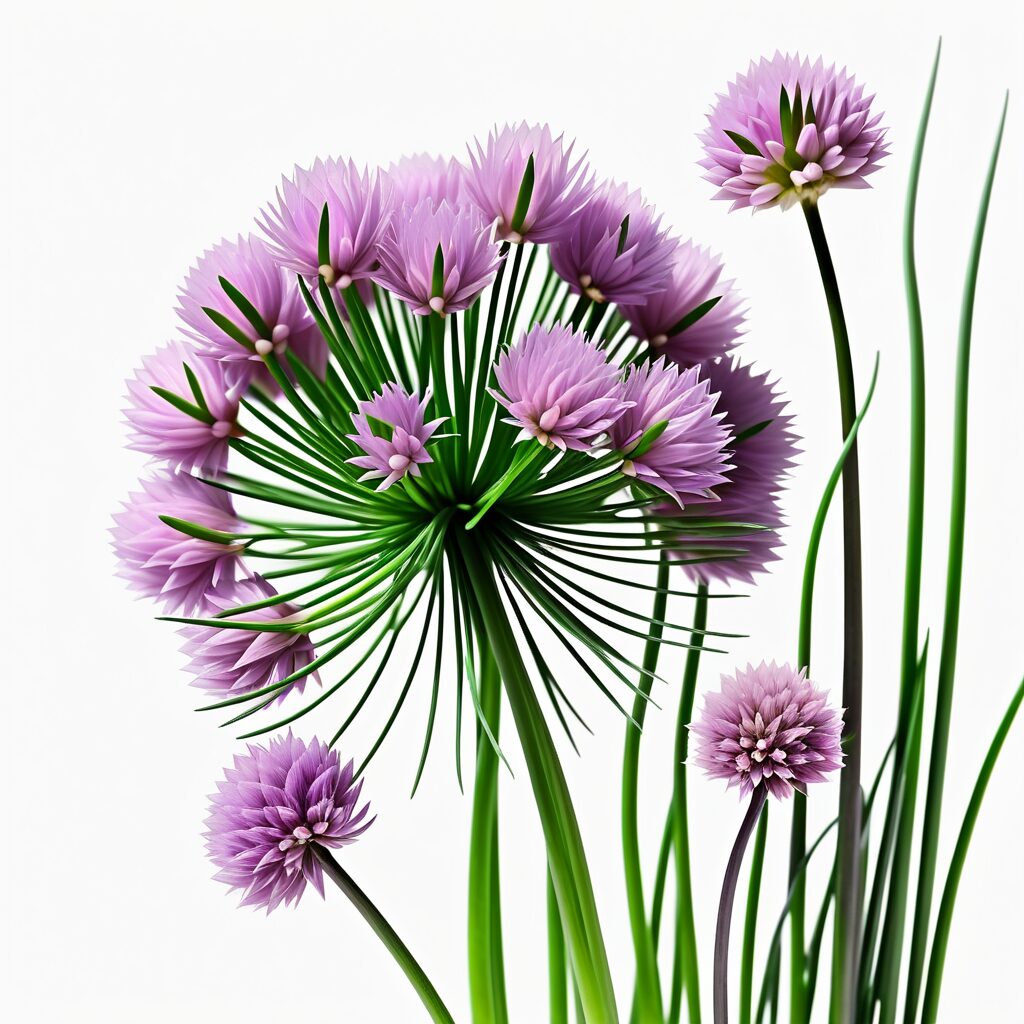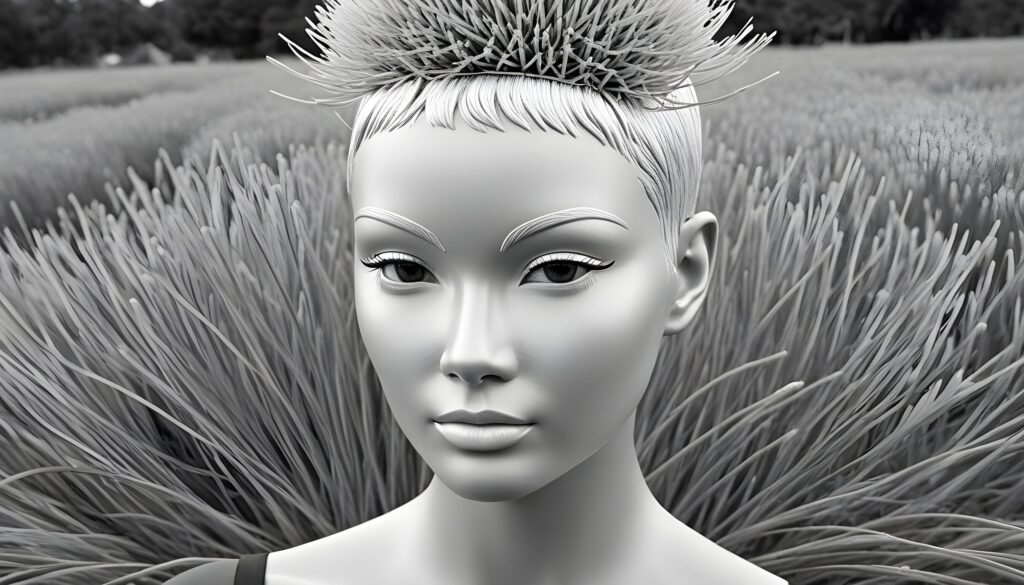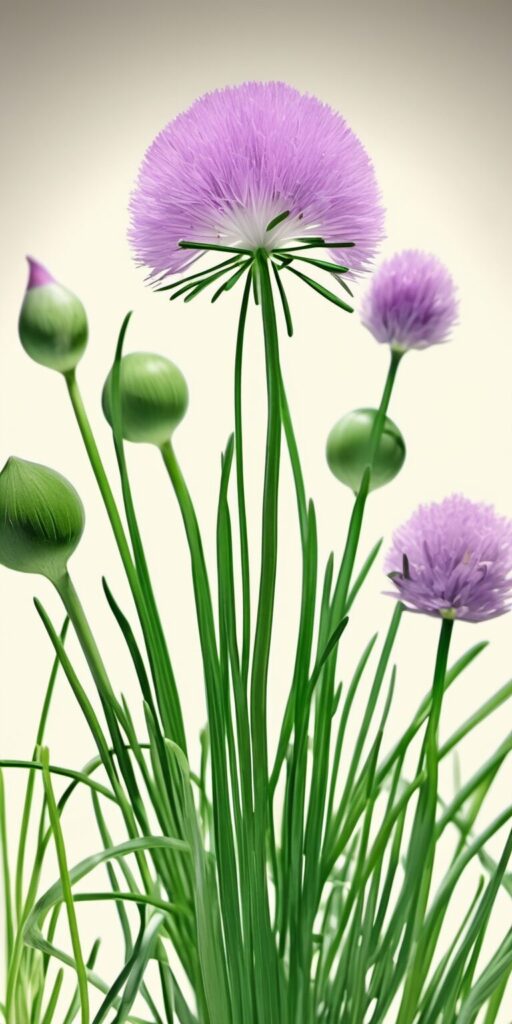Chives greet me like an old friend, filling the air with their gentle, oniony aroma and adding a splash of green vibrancy to the landscape and my salads and dinners. These slender green shoots, often overlooked as mere garnishes, hold a deeper connection—a whisper of nature’s nurturing touch and a testament to the simple yet profound beauty that thrives in everyday life. Chives are not just a culinary companion; they’re a confidant and a healer, a silent orchestra playing a symphony of flavor and health. They’re a poignant reminder that beauty can often be found in the smallest things, whispering louder than shouts, crafting unexpected melodies that resonate on both the palate and in the heart long after the last bite has been savored.



When you next encounter chives, pause to appreciate them beyond the scope of an ingredient. Listen to their story, whispered in the wind, detailed in the pages of history, and savored in the burst of flavor on your tongue. You may discover a rich tapestry waiting to be unearthed—a melody of green magic eager to bloom within your culinary adventures. Chives beckon you to engage your senses and embrace their history, their subtleties, and their myriad benefits.
Often underestimated, chives possess a medicinal magic that belies their modest appearance. Within those narrow, tubular leaves lies an arsenal of antioxidants, a brilliant combination including allicin, quercetin, and kaempferol. These bioactive compounds stand as a shield against free radicals, helping prevent cellular damage that can lead to chronic conditions like cancer and heart disease. Just as in their allium cousins, chives contain thio-sulfinates, which convert to allicin upon disruption of the leaves through chopping or crushing. This enzymatic reaction is a key component in their defensive prowess, reducing cholesterol by inhibiting the hmg-coa reductase enzyme—a crucial aspect of liver function. Thus, regular consumption of chives not only enhances the flavor of your dishes but also fortifies your body’s defenses, fostering resilience and strength.
But chives offer so much more than the tangible benefits of antioxidants. Their rich Vitamin C content boosts the immune system, aiding in the fight against illness and promoting overall health. For those troubled by restlessness or mood imbalances, chives contain choline, an active ingredient that champions restful sleep and balanced moods. This translates into a sharper memory, enhanced learning abilities, and a happier, more stable disposition. The power embedded within chives extends into the realm of cancer prevention, particularly in fighting esophageal and abdominal cancers, through their unique nutrient profile that effectively hinders tumor growth.
Furthermore, chives champion bone health. They are a remarkable source of Vitamin K—essential for maintaining bone density and preventing conditions such as osteoporosis and fractures. Vitamin K also regulates cellular processes, helping to prevent bone demineralization by aiding the production of osteocalcin, a protein vital for bone mineral density. In fact, chives contain more Vitamin K than even scallions do, with a hundred-gram serving offering 177% of the daily recommended intake. This nutrient does double duty by protecting the brain, establishing its role in the treatment of diseases like Alzheimer’s by limiting neuronal damage.
Allicin’s presence also contributes significantly to cardiovascular wellness. By releasing nitric oxide, a vasodilator, it reduces blood vessel stiffness, thereby lowering blood pressure—decreasing risks of coronary artery disease, peripheral vascular diseases, and stroke. Allicin also blocks platelet clot formation while providing fibrinolytic activity in blood vessels, further safeguarding heart health.
Chives even extend their utility to more everyday practicalities. The juice of chives can function as an insect repellent, offering another layer of nature’s defense. Meanwhile, for those wrestling with the “blues,” chives yield a bounty of folic acid which curbs homocysteine production—a compound linked to mood disorders—and promotes healthy brain function. Folic acid is also a cornerstone in preventing birth defects, highlighting the critical role chives play in fostering well-being from conception onwards.
The range of vision-enhancing antioxidants in chives, such as zeaxanthin and carotenes like lutein, safeguard your eyes from stress, helping prevent cataracts and maintaining sharp vision. Potassium and allicin, fundamental components found in chives, work together to support healthy blood flow and circulation, reducing heart disease risks like stroke and atherosclerosis. Quercetin, another notable compound, manages cholesterol levels and controls arterial plaque buildup, bolstering cardiovascular health further.
Allicin, the very compound responsible for the identifying aroma of onions and garlic, exerts a powerful anti-inflammatory effect. It is a potent agent in managing conditions like arthritis and rheumatism, offering relief and encouraging healing. Furthermore, the antibacterial properties of allicin and sulfur compounds provide a natural shield against pathogens, inhibiting the growth of harmful bacteria in the gut and improving digestion and immunity. This can also aid in balancing the gut microbiome, benefiting those with digestive disturbances.
While their gastronomic importance is well-recognized, chives repeatedly reveal themselves to be an unparalleled nutritional powerhouse. They supply more Vitamin A than any other member of the allium family, imparting 145% of the daily recommended levels within a hundred grams. This bounty also includes substantial amounts of B-complex vitamins, fostering energy metabolism, skin maintenance, and overall vitality—a super herb that enriches your diet effortlessly.
Chives also supply key minerals critical to health, like copper, essential for iron metabolism and red blood cell formation; iron, which helps deliver oxygen across the body; manganese, instrumental for bone health and metabolism; zinc, necessary for immune function and DNA synthesis; and calcium, crucial for strong bones, teeth, and nerve function. Though these mineral levels are modest, chives contribute as part of a broader nutritious palette.
The historical allure of chives is steeped in tales of charm and mystique. Once believed to ward off evil spirits by the Greeks, utilized as love potions by Romans, and cherished by Chinese emperors for longevity, chives tell a rich narrative—ancient whispers echoing through time and across cultures, maintaining their relevance both in the culinary field and the garden.
For those in pursuit of balanced energy (dosha), chives accommodate Vata by warming and grounding its airy nature, and they soothe Pitta through their cooling and Kapha-reducing attributes. Chives embody the principles of clarity, balance, and well-being celebrated in Ayurveda as a sattvic food.
Emerging from clusters of green clumps, chive stems stand like whispers of spring—lively emerald spears ready to enrich any dish. These tender hollow tubes hold a delicate, yet potent aroma, gracing gardens and platters with their verdant elegance. With cheerful optimism, the presence of chives elevates meals, ensuring they’re always more than just a flavor additive—they are contributors to a broader sensory and healthful tapestry.
Chives bolster the immune system with their Vitamin C content, soothe coughs with honeyed infusions, and combat harmful bacteria through allicin. They nurture bones with Vitamin K and enhance cognitive function with choline. Furthermore, the folic acid they provide fosters emotional stability—each sprinkle of chives is a step toward better health in every meal.
Growing chives is uncomplicated yet rewarding. Thriving under full sun in well-drained soil, these small perennial herbs develop from seeds or bulb divisions and require regular pruning to maintain health. Every few years, dividing the plants prevents root crowding and diseases, while their blooms attract beneficial bees and pollinators.
Chive flowers double as a decorative touch and a pest deterrent when planted near rose bushes, improving rose health. They also serve as a grass barrier, preventing encroachment while forming a resilient, dense mat. Their flowers add vibrancy and flavor to gardens and dishes alike, lending chive vinegar a beautiful pink hue for salad dressings.
Chives surprise with their suite of benefits visibly extending their significance beyond the kitchen to both a gardener’s aide and a culinary muse. Chive recipes like chive butter showcase their adaptability, offering a luxurious spread that elevates meals with little preparation required. Finely incorporate fresh, chopped chives into softened butter for a condiment that pairs beautifully with meats, vegetables, or pasta dishes—enhancing each bite with rustic simplicity.
By integrating chives into our diets and gardens, we embrace a wealth of flavors and health benefits that support overall well-being. They bridge the gap between taste and health, fusing them into a cohesive lifestyle choice reflecting the harmonious symphony of life—and demonstrate that often the most unassuming plants can bring the most extraordinary gifts. As you harvest their vibrancy in the morning’s cool air and reintroduce their gentle bite into your meals, allow yourself to bloom alongside them, bonding with their spirited green tenacity.




